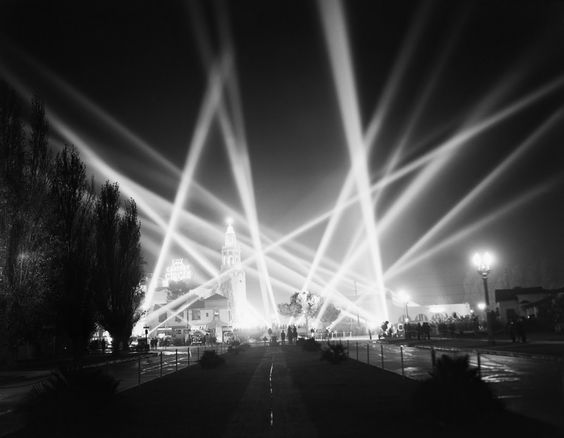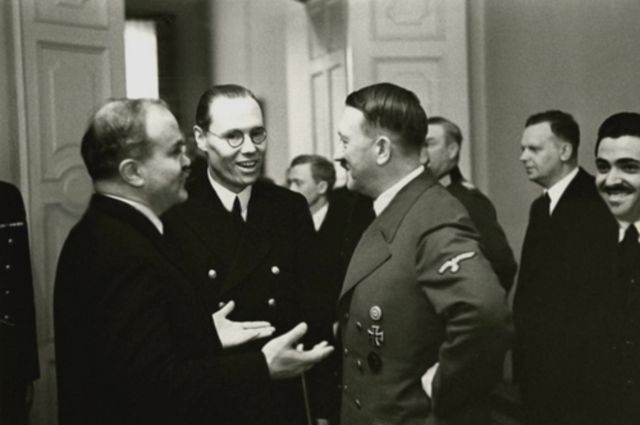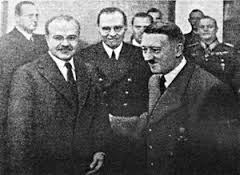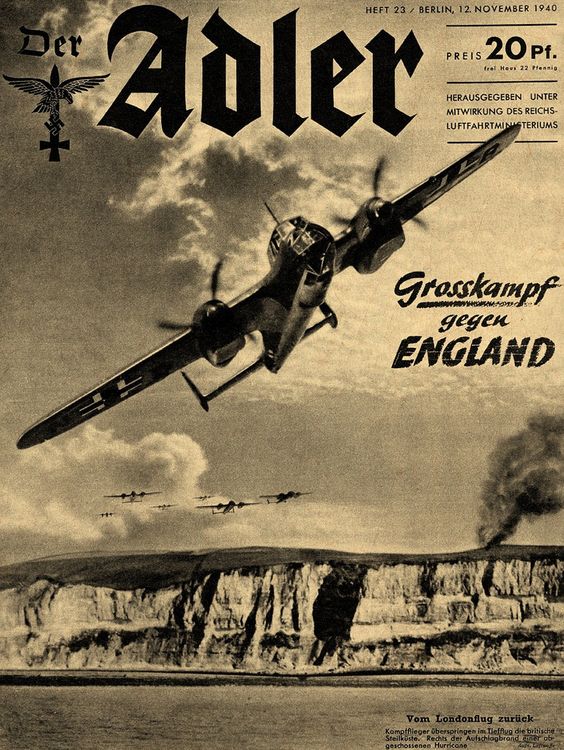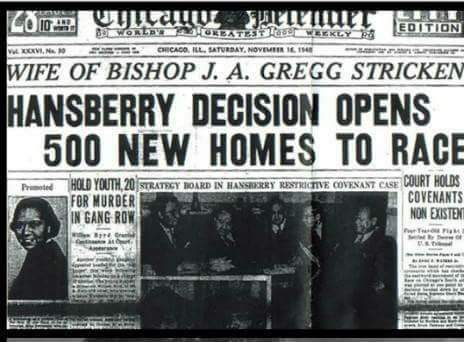Friday 15 November 1940
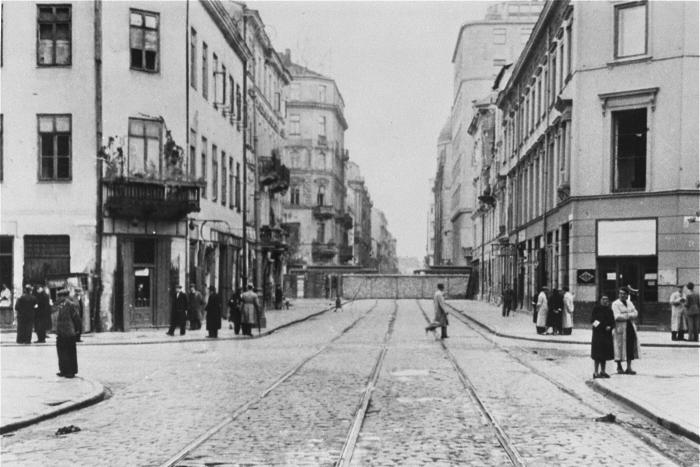 |
| The Warsaw ghetto blocking a major thoroughfare. — US Holocaust Memorial Museum, courtesy of Dwight D. Eisenhower Library. |
European Air Operations: The Luftwaffe's Operation Moonlight Sonata, a massive air attack against the industrial city of Coventry, concludes in the early morning hours. Aside from the devastation to the city, it is a major propaganda coup for the German news services. The Reich media coins and uses the verb "Coventrate" for the destruction of British cities, as in, "We will Coventrate all of England."
After dark, the Luftwaffe launches another major raid, this time against London with 358 bombers.
RAF Bomber Command sends 67 Wellington, Whitley and Hampden bombers against Hamburg.
Feldwebel Karl Hier of JG 76 is shot down and killed by Spitfires over London. He had 15 victories.
 |
| A couple at their destroyed Coventry home, 15 November 1940. |
The survivors of the Kohinur are picked up by 7,614-ton Norwegian tanker Havbør. However, U-65 then torpedoes and sinks the Havbør, too. The Havbør's oil spreads over the water and catches fire, incinerating men struggling in the water. In this sinking, 31 men from the Kohinur and 28 men of the Havbør perish. The tanker takes seven hours to sink, and only four men survive. Accounts of the number of men saved and lost on these two ships vary greatly, as things get confused when two ships go down near each other.
The Luftwaffe attacks Convoy FN 34. It bombs and badly damages 263-ton Royal Navy trawler HMT Dungeness in the North Sea off Haisborough, Norfolk. The ship remains afloat but is written off.
In the same attack, the Luftwaffe also bombs and sinks 712-ton British coaster Blue Galleon. There are three deaths.
Focke-Wulf Fw 200 Condors (1,/KG 40) operating out over the Atlantic sea lanes attack Convoy SL 53. They bomb and sink 9333-ton British passenger ship Apapa west of Achill Head, County Mayo, Ireland. There are 24-28 deaths, while 230 people survive. The ship is carrying £19,188 worth of gold.
British 297-ton coaster Amenity hits a mine and sinks in the North Sea off Spurn Head, Yorkshire. All seven men on board survive.
British 102-ton tug Guardsman hits a mine and sinks off North Foreland. There are two deaths.
British 143-ton coaster Penryn collides with another ship in the Liverpool approaches and sinks.
United States destroyer USS Plunkett is on Neutrality Patrol off Tampico and observes German freighter Orinoco and tanker Phrygia as they begin to leave the area to return to Germany.
Convoy FN 335 departs from Southend, Convoy FS 336 departs from Methil, Convoy AN 7 departs from Alexandria and Port Said (bound for Piraeus).
Royal Navy corvette HMS Delphinium (K 77, Commander Robert L. Spalding) is commissioned.
United States submarine USS Trout (SS 202, Lt. Commander Frank Wesley Fenno, Jr.) is commissioned.
 |
| Cleanup and fire-dousing have only begun at Coventry on 15 November 1940. |
The Italians send a strafing mission against Mersa Matruh with 25 CR 42 biplane fighters.
Force H, split up into Forces A and B, departs from Gibraltar on Operation White. This is a convoy to fly Hurricanes to Malta.
At Malta, the government warns the public not to send postcards abroad with pictures of Malta that might be useful to the Italians.
Battle of the Indian Ocean: German raider Pinguin rendezvouses with converted minelayer Passat at their prearranged meeting spot several hundred miles west of Australia. Both ships have completed extensive minelaying operations off Australia.
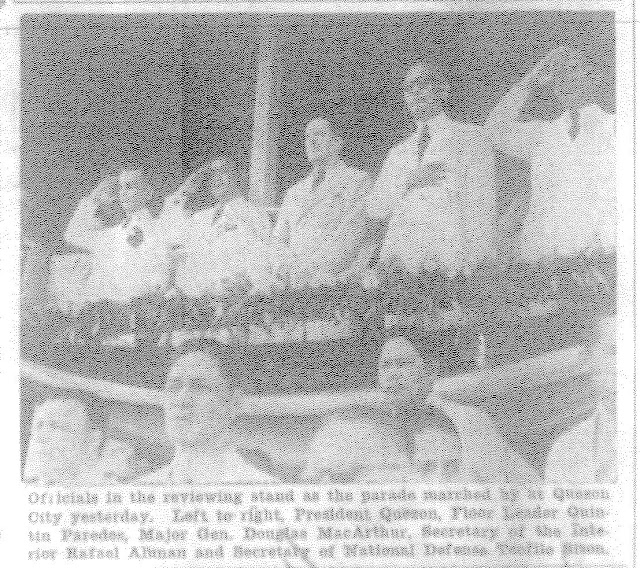 |
| Commonwealth Day, Quezon City, November 15, 1940. From the Manila Bulletin microfilm of the University of the Philippines Main Library. |
Japanese Military: Isoroku Yamamoto, considered an expert on the US military, is promoted to the rank of Admiral in the Imperial Japanese Navy. Hiroaki Abe takes charge of Japanese Navy Destroyer Squadron. Vice Admiral Teruhisa Komatsu takes command of the Ryojun Military Port at the port formerly known as Port Arthur. Rear Admiral Shigeki Ando becomes chief of staff of the Chinkai Guard District in southern Korea.
Imperial Japanese Navy aircraft carrier Ryujo returns to service after repairs. The Ryujo joins the 3rd Carrier Division of the 1st Fleet. The Ryujo has sixteen A5M4 fighters and eighteen B5N1 carrier attack planes. The aircraft carrier Akagi is posted to the Yokosuka Naval District. Japanese cruiser Tenryū undergoes repairs to her boilers and upgrading her armament. Captain Yuji Takahashi takes command.
US Military: US flying boats begin patrol operations from Bermuda. These are new bases obtained from the British in the destroyers-for-bases deal.
Heavy cruiser USS Louisville arrives in Santos, Brazil as part of its "Show the Flag" operation.
Gabon: Free French leader Charles de Gaulle arrives in Libreville and makes a personal appeal to the captives of the battles of Libreville and Port Gentil. Very few respond positively, and the men are sent to become POWs at Brazzaville, French Congo. The French now focus on Libya. Gabon is the first territory controlled by the Free French.
Holocaust: The Germans seal off the Warsaw Ghetto. It contains 400,000 Jews in a very restricted space. While there are numerous dates that are available as the "start" of the Warsaw Ghetto, this is when it actually becomes a walled prison.
 |
| "Popeye the Sailor with Poopdeck Pappy #89." |
"Three Men From Texas" starring William Boyd as Hopalong Cassidy premieres today.
"Popeye the Sailor with Poopdeck Pappy #89" premieres today.
Future History: Robert Cavalli is born in Florence, Tuscany, Italy. He becomes a leader in the fashion industry, making his breakthrough by inventing and patenting a printing procedure on leather. He remains a powerful force in the fashion industry.
Samuel Waterston is born in Cambridge, Massachusetts. He becomes a stage actor and makes his film debut in 1965. After starring in many popular films, Waterston becomes a popular regular on television series Law & Order from 1994-2010. Waterston continues to act and has a star on the Hollywood Walk of Fame.
November 1940
November 1, 1940: Hitler Irate
November 2, 1940: U-31 Sunk - Again
November 3, 1940: Kretschmer's Master Class
November 4, 1940: Spain Absorbs Tangier
November 5, 1940: Jervis Bay Meets Admiral Scheer
November 6, 1940: San Demetrio Incident
November 7, 1940: Galloping Gertie
November 8, 1940: Italian Shakeup in Greece
November 9, 1940: Dutch Fascists March
November 10, 1940: Fala and Doc Strange
November 11, 1940: Taranto Raid
November 12, 1940: Molotov Takes Berlin
November 13, 1940: Molotov Foils Hitler
November 14, 1940: Moonlight Sonata
November 15, 1940: Warsaw Ghetto Sealed
November 16, 1940: France Keeps Battleships
November 17, 1940: Malta Hurricane Disaster
November 18, 1940: Hitler Berates Ciano
November 19, 1940: Birmingham Devastated
November 20, 1940: Hungary Joins Axis
November 21, 1940: Dies White Paper
November 22, 1940: Italians Take Korçë
November 23, 1940: U-Boat Bonanza!
November 24, 1940: Slovakia Joins In
November 25, 1940: Molotov's Demands
November 26, 1940: Bananas Be Gone
November 27, 1940: Cape Spartivento Battle
November 28, 1940: Wick Perishes
November 29, 1940: Trouble in Indochina
November 30, 1940: Lucy and Desi Marry
2020




